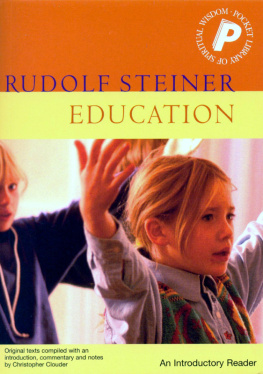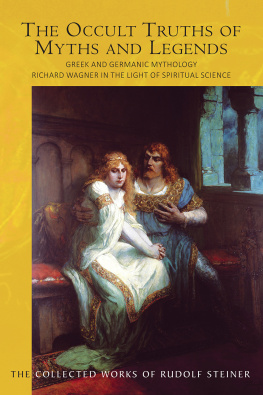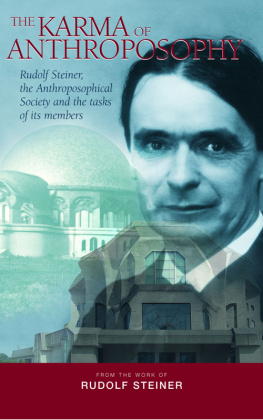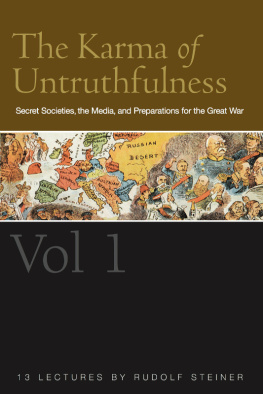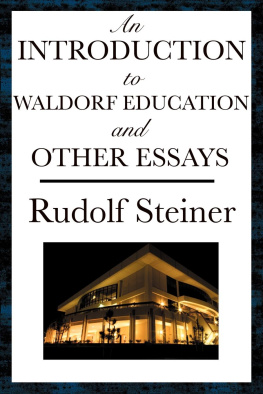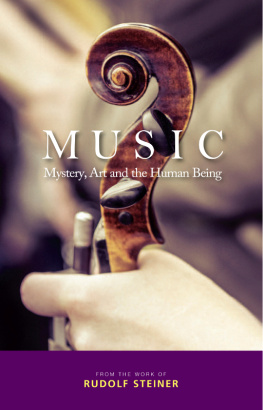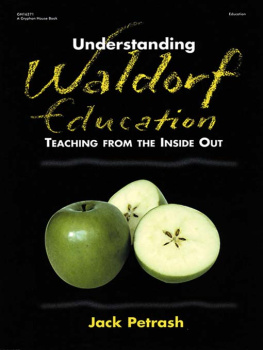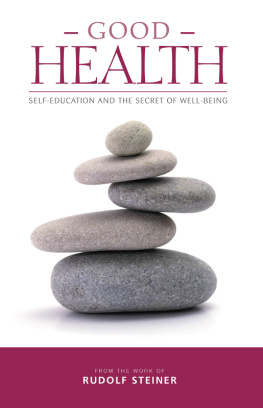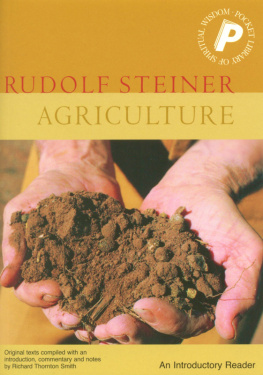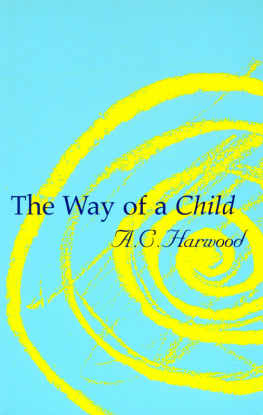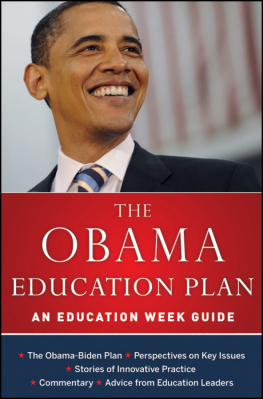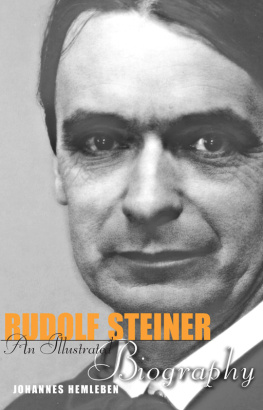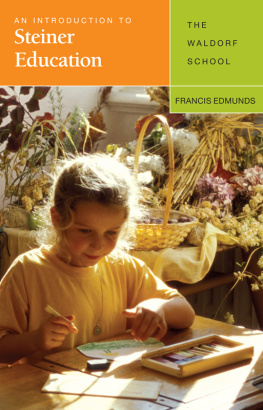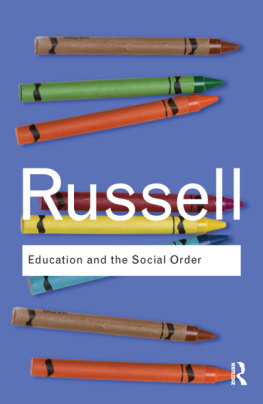EDUCATION

Also available:
(Practical Applications)
Agriculture
Architecture
Art
Medicine
Religion
Science
Social and Political Science
(Esoteric)
Alchemy
Atlantis
Christian Rozenkreutz
The Druids
The Goddess
The Holy Grail
RUDOLF STEINER
EDUCATION
An Introductory Reader
Compiled with an introduction,
commentary and notes by
Christopher Clouder
Sophia Books
All translations revised by Christian von Arnim
Sophia Books
An imprint of Rudolf Steiner Press
Hillside House, The Square
Forest Row, RH18 5ES
www.rudolfsteinerpress.com
Published by Rudolf Steiner Press 2012
For earlier English publications of individual selections please see Sources
The material by Rudolf Steiner was originally published in German in various volumes of the GA (Rudolf Steiner Gesamtausgabe or Collected Works) by Rudolf Steiner Verlag, Dornach. This authorized volume is published by permission of the Rudolf Steiner Nachlassverwaltung, Dornach (for further information see Note Regarding Rudolf Steiners Lectures)
This selection and translation Rudolf Steiner Press 2003
All rights reserved. No part of this publication may be reproduced, stored in a retrieval system, or transmitted, in any form or by any means, electronic, mechanical, photocopying or otherwise, without the prior permission of the publishers
A catalogue record for this book is available from the British Library
ISBN 978 1 85584 335 6
Cover photograph by Aliki Sapountzi
Cover design by Andrew Morgan
Typeset by DP Photosetting, Aylesbury, Bucks.
CONTENTS
Introduction
by Christopher Clouder
Although the texts in this book are the records of lectures given nearly a century ago, they still have a particular resonance for those concerned with education in the contemporary context. Rudolf Steiners insights are as relevant to us as educators as they were to the people of his own time. His diagnosis of the failings of the educational system that was then practised and his emphasis on the real needs of the child are salutary reminders that in education we are faced with the continual struggle to improve, while at the same time responding to the new questions posed by social, economic and cultural changes. Yet in some respects we can find a constant. We struggle to realize principles and ideals and simultaneously assist children to find the capacities to live a life that involves compromises and an ability to adapt. Piaget stated that the true definition of intelligence is knowing what to do when you dont know what to do. This is an intelligence that will increasingly be called upon in our twenty-first century world as the challenges facing us become more complex and demanding. Individual initiative and responsibility are essential in the creation of values and social harmony. The world is up for reinvention in so many ways. Creativity is born in chaos, what we do, why we do it, when we do itthese may be different and they could be better... Change comes from small initiatives that work, initiatives, which initiated, become the fashion. We cannot wait for great reasons from great people... It is up to us to light our own small fires in the darkness.
We are constantly being reminded that we live in a turbulent and changing world; our children will live in a world that we can barely conceive; and we can perceive that even the quality of childhood experience is a rapidly evolving one. With such a prognosis before us, education, in whatever context, cannot serve merely as a transmitter of accumulated knowledge but must take on formidable new tasks and be prepared to re-evaluate its methods, practices and intentions continually. Steiners emphasis on this aspect of education as a force for renewal has a long West European pedigree dating back to Charlemagne in the ninth century CE . As King of the Franks and Emperor of the West, he set about cultural and political renewal of the state and a transformation of his people by implementing educational reforms and encouraging a new enthusiasm for human knowledge. This new enthusiasm is a necessary concomitant for our intentions too and speaks clearly through all Steiners 200 pedagogical lectures as well as his conversations with children, parents and teachers.
David Elkind, the eminent professor of child development at Tufts University, Massachusetts, recently wrote an article entitled Schooling the Postmodern Child, in which he states that Steiner was a forward-looking modern educational theorist whose insights are of great value in the post-modern educational debate. As we now increasingly live with the phenomenon of permeable families, rather than the more traditional and stable nuclear or extended family, Steiner education becomes a necessary area of stability and integration. Our society requires us to play many roles. In industry and commerce, for instance, familiar boundaries of work definition are less and less applicable and secure careers are no longer for life. We have to learn to coordinate our efforts in new ways. In many countries there is a shift in age structure with longer life expectancies and declining mortality rates as well as aging populations; female labour force participation has increased dramatically over the last two decades. Schools have taken on parental functions and early-years centres have to take responsibility for day care that was once seen as the province of the family. The international concept of early childhood education and care brings together concepts and tasks that were previously discrete. The extended teacher-pupil relationship and the childs self-evident and uninterrupted belonging in the social grouping of a school class that is provided by Steiner education provides a place of secure interaction for the child. This sense of security and being respected and liked for who one is, as well as knowing that ones contribution to the class is welcomed, provides a healthy basis for self-confidence and later personal development
The approach to a curriculum that Steiner pioneered, where the growth of knowledge and skills are viewed as an artistic and integrated totality, goes beyond the artificial subject divisions of a regulated timetable and prescriptive curriculum. Within a secure and predictable form children can find their own creative interrelationships. Elkind points out that the use of the narrative as a tool of understanding and comprehension, which is implicit in the Steiner method, takes into account the most fundamental way we, as humans, learn anything at all that goes beyond the boundaries of logic and reason. He concludes: Steiners pedagogy is extremely innovative and particularly suited to the post-modern orientation and the permeable family. It remains for the rest of society to discover this educational programme that is so uniquely adapted to the needs and interests of the children growing up in todays post-modern world.
Already in 1898 Steiner was developing radical new ideas about new educational forms: Whether we have doubts about the veracity of what we convey or do not convey to the youth of today is of no importance. We convey these to young people with the implication: this is how we see the world; now look yourselves as to how the world appears to you. We have to awaken capacities and not offer convictions. These guidelines are not an infinitely adaptable template but rather a resource for individual initiative and insight. Each school is autonomous and only the school community and those who have direct responsibility can make the necessary decisions that often require courage, self-development and creativity. Yet all share a common responsibility and wish to work together across all boundaries and hindrances. After more than 80 years of such experience, Steiner education is having an influence on the well-being of children that reaches beyond the confines of the schools and kindergartens themselves. This brings with it new challenges and paradoxes that confront all forward-looking educational practices and practitioners.
Next page
